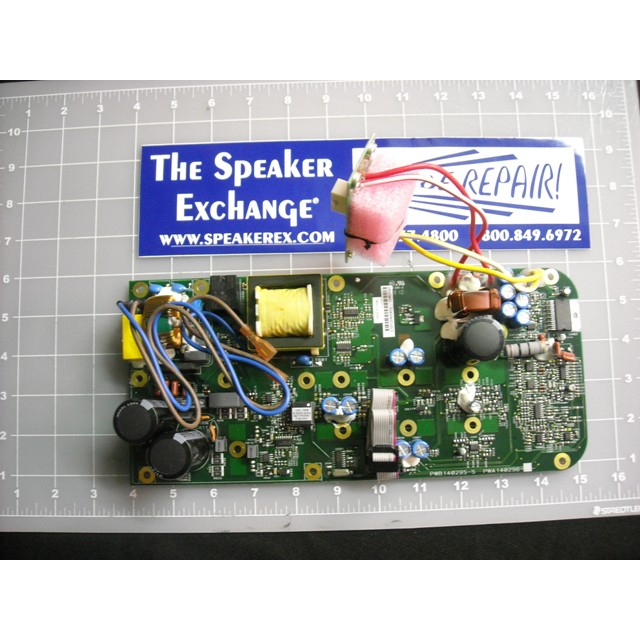mstanley117
Member
Hey there folks,
I have a pair of JBL S3900 that I recently acquired, and it seems that in one of the speakers the upper frequency crossover recently decided to malfunction recently.
The symptoms are that the mid range/treble compression driver has lower output than the other speaker. After taking apart the speaker (not fully) and testing the upper frequency crossover I found that by bypassing the crossover I got much higher output from the midrange compression driver. A visual observation of the board did not find anything out of place, no bloated caps, nothing looked like it had burn marks or poor connections, all the parts were there, and none of the solder joints were loose.
I've tried to do some searching around, and I have had minimal luck in finding a replacement crossover. I found the service manual with the part # (400-0479-001 / XOVER, UHF/HF - S3900), but I have had no luck finding this available anywhere.
I'm going to try reaching out later this week to JBL to find out if they have anything, and I've also contacted some other parts dealers as well as a somewhat local JBL dealer (https://www.safeandsoundhq.com/). That being said, has anyone had any luck finding replacement parts or could point me in the right direction?
Worst case scenario, the service manual has the individual parts lists / specs and the schematic, so I could re-build the crossover myself (which it may come down to), but my electronics skills aren't exactly top notch haha. For those of you that have built crossovers, what's a good online supplier for electronics in this case?
Edit: Also, in case anyone was wondering, here's the parts list for the upper frequency crossover:
Best,
I have a pair of JBL S3900 that I recently acquired, and it seems that in one of the speakers the upper frequency crossover recently decided to malfunction recently.
The symptoms are that the mid range/treble compression driver has lower output than the other speaker. After taking apart the speaker (not fully) and testing the upper frequency crossover I found that by bypassing the crossover I got much higher output from the midrange compression driver. A visual observation of the board did not find anything out of place, no bloated caps, nothing looked like it had burn marks or poor connections, all the parts were there, and none of the solder joints were loose.
I've tried to do some searching around, and I have had minimal luck in finding a replacement crossover. I found the service manual with the part # (400-0479-001 / XOVER, UHF/HF - S3900), but I have had no luck finding this available anywhere.
I'm going to try reaching out later this week to JBL to find out if they have anything, and I've also contacted some other parts dealers as well as a somewhat local JBL dealer (https://www.safeandsoundhq.com/). That being said, has anyone had any luck finding replacement parts or could point me in the right direction?
Worst case scenario, the service manual has the individual parts lists / specs and the schematic, so I could re-build the crossover myself (which it may come down to), but my electronics skills aren't exactly top notch haha. For those of you that have built crossovers, what's a good online supplier for electronics in this case?
Edit: Also, in case anyone was wondering, here's the parts list for the upper frequency crossover:
C1 5.6 uf 5% 100V polypropylene
C2 7.5 uf 5% 100V polypropylene
C3 1.5 uf 5% 100V polypropylene
C4 3.9 uf 5% 100V polypropylene
C5 1.2 uf 5% 100V polypropylene
C6 1.2 uf 5% 100V polypropylene
C7 1.5 uf 5% 100V polypropylene
L1 2.0 mH 5% air core DCR = 0.9 - 1.1 ohm
L2 0.06 mH 5% air core DCR < 0.2 ohm
L3 0.3 mH 5% air core DCR < 0.4 ohm
L4 0.2 mH 5% air core DCR < 0.3 ohm
L5 0.45 mH 5% air core DCR < 0.5 ohm
L6 0.036 mH 5% air core DCR < 0.15 ohm
L7 0.091 mH 5% air core DCR < 0.25 ohm
R1 15 ohm 5% 5W Metal Oxide
R2 18 ohm 5% 5W Metal Oxide
R3 18 ohm 5% 5W Metal Oxide
R4 18 ohm 5% 5W Metal Oxide
R5 15 ohm 5% 5W Metal Oxide
R6 2.4 ohm 5% 5W Metal Oxide
R7 3.0 ohm 5% 5W Metal Oxide
R8 3.9 ohm 5% 2W Metal Oxide
R9 1.5 ohm 5% 2W Metal Oxide
C2 7.5 uf 5% 100V polypropylene
C3 1.5 uf 5% 100V polypropylene
C4 3.9 uf 5% 100V polypropylene
C5 1.2 uf 5% 100V polypropylene
C6 1.2 uf 5% 100V polypropylene
C7 1.5 uf 5% 100V polypropylene
L1 2.0 mH 5% air core DCR = 0.9 - 1.1 ohm
L2 0.06 mH 5% air core DCR < 0.2 ohm
L3 0.3 mH 5% air core DCR < 0.4 ohm
L4 0.2 mH 5% air core DCR < 0.3 ohm
L5 0.45 mH 5% air core DCR < 0.5 ohm
L6 0.036 mH 5% air core DCR < 0.15 ohm
L7 0.091 mH 5% air core DCR < 0.25 ohm
R1 15 ohm 5% 5W Metal Oxide
R2 18 ohm 5% 5W Metal Oxide
R3 18 ohm 5% 5W Metal Oxide
R4 18 ohm 5% 5W Metal Oxide
R5 15 ohm 5% 5W Metal Oxide
R6 2.4 ohm 5% 5W Metal Oxide
R7 3.0 ohm 5% 5W Metal Oxide
R8 3.9 ohm 5% 2W Metal Oxide
R9 1.5 ohm 5% 2W Metal Oxide
Best,
Last edited:

